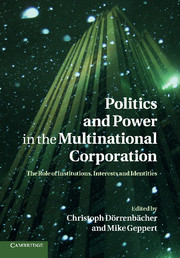 Politics and Power in the Multinational Corporation
Politics and Power in the Multinational Corporation Published online by Cambridge University Press: 26 April 2011
Germany has somehow managed to create a high-wage, unionized economy without shipping all its jobs abroad or creating a massive trade deficit, or any deficit at all … Why is Germany beating us?
(Geoghegan 2010: 7)Introduction
The above quote appeared in a recent edition of Harper's Magazine in the USA and raises some interesting questions by contrasting distinctive management and employment practices in the German manufacturing sector with current dilemmas faced by firms situated in and originating from liberal market economies in the wake of the recent financial crisis. In this chapter we seek to explain why these distinctive practices remain robust in the face of pressures from globalization, based on a survey of some of the current literature on plant-level employment relations in Germany. Our survey focuses on the important role played by local managers and workers' representatives as socio-political strategists, who are able to draw on critical power resources within multinational companies (MNCs) operating in Germany to safeguard skills and jobs in German plants.
In the first part of the chapter we reflect on ideas that stress the importance of local institutions and the role of local actors for institution building in transnational social spaces, referring to the idea of the MNC as a “contested terrain” (Edwards and Bélanger 2009; see also chapter of Morgan in this volume). We look at emerging opportunities for socio-political strategizing by local actors in Germany and link these to institutional resources provided by the German model of employment relations, which provide local actors with critical resources.
To save this book to your Kindle, first ensure [email protected] is added to your Approved Personal Document E-mail List under your Personal Document Settings on the Manage Your Content and Devices page of your Amazon account. Then enter the ‘name’ part of your Kindle email address below. Find out more about saving to your Kindle.
Note you can select to save to either the @free.kindle.com or @kindle.com variations. ‘@free.kindle.com’ emails are free but can only be saved to your device when it is connected to wi-fi. ‘@kindle.com’ emails can be delivered even when you are not connected to wi-fi, but note that service fees apply.
Find out more about the Kindle Personal Document Service.
To save content items to your account, please confirm that you agree to abide by our usage policies. If this is the first time you use this feature, you will be asked to authorise Cambridge Core to connect with your account. Find out more about saving content to Dropbox.
To save content items to your account, please confirm that you agree to abide by our usage policies. If this is the first time you use this feature, you will be asked to authorise Cambridge Core to connect with your account. Find out more about saving content to Google Drive.